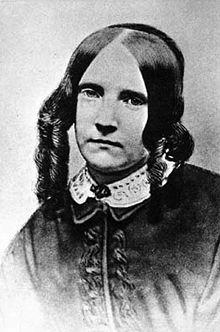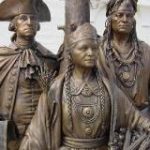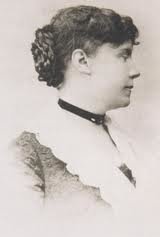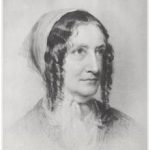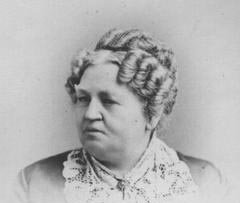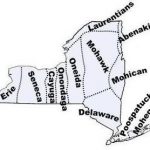Author and Daughter of James Fenimore Cooper
Susan Fenimore Cooper was a writer and amateur naturalist, who is best known for Rural Hours, her nature diary of Cooperstown, New York. She also wrote a novel, short stories, children’s stories, and dozens of magazine articles on a wide variety of subjects.
Early Years
Susan Augusta Fenimore Cooper was born on April 17, 1813 in Scarsdale, New York, the daughter of the novelist James Fenimore Cooper and Susan De Lancey Cooper. She was their second child, and the eldest to survive childhood. In the summer of 1813 the Coopers traveled to Cooperstown, New York, the settlement founded by James’ father, Judge William Cooper. Along the way they stopped to rest and Susan’s older sister Elizabeth ate some over-ripe strawberries and she died soon after from food poisoning.
A few months later the family moved permanently to Cooperstown, where her father began his literary career. In 1817 the family returned to Westchester County, where the De Lanceys lived; these were Mrs. Cooper’s relatives. One day Cooper tossed aside one of several novels just received from England, with the statement that he could write a better book than that, and his wife challenged him to do so. He wrote several during the next few years.
The family, which grew to include three more daughters and two sons, moved to New York City in 1822 and Susan was enrolled in private school there. In 1826 James Fenimore Cooper was appointed United States Consul for Lyons, France, and the family sailed for Europe aboard the Hudson on June 1, 1826.
From 1826 to 1833 the Coopers lived abroad, based in Paris, but traveling throughout Europe. During this period Susan attended a boarding school in France and was privately tutored during the two years the family spent in Italy. Not only was she educated in both American and European literature, she studied languages and the arts, as well as basic botany and zoology – an excellent education for a girl at that time.
When they returned from Europe in 1833 the family lived in New York City, and then permanently settled in Cooperstown in 1836. Susan was 23 years old. She and her father were very close; she became his literary secretary and they often edited each other’s work.
Susan’s attachment to her father and his overbearing nature probably contributed to her decision to remain single. It has been said that Cooper actively discouraged his daughter from getting married, and that he found fault with all of her potential suitors, including Samuel F. B. Morse, inventor of the telegraph. Susan turned away all suitors who approached her.
In a letter to his nephew Richard Cooper in Cooperstown in 1833, James Fenimore Cooper wrote from Paris:
You speak of some report as in connexion with Mr. Morse and your eldest cousin. Surely they who speak of such a thing can have no idea of the fitness of things. Mr. Morse is an old friend of mine, but neither of my daughters would dream of making a husband of him. Morse is an excellent man, but not just the one to captivate a fine young woman of twenty.
I had proposals for Susan, last week, coming from a Frenchman of good fortune, noble family, and very fair looks, but the thing would not do. We mean to continue Americans. These things, however, ought always to be respected as family secrets. You can contradict the silly report about Mr. Morse, with confidence.
Literary Career
With help from her father, Cooper published her first book, a domestic novel entitled Elinor Wyllys (1846), which she wrote under the pseudonym Amabel Penfeather. This is the story of an unattractive but virtuous country girl as the title character. Elinor is an orphan whose fiance abandons her after falling in love with her more attractive friend, only to be later spurned by the friend. He then returns to Elinor and they are eventually reconciled. The novel was not as well received as other works of domestic fiction.
Susan rejected notions of equality for women, and as the devoted daughter of James Fenimore Cooper, she was often overshadowed by her more famous father. It was to be expected that her father’s review of her work would be favorable, but after reading Susan’s second book, Rural Hours, he does not exactly praise her. In a letter to his wife from his New York publisher’s office in March 1850, he wrote:
I have written to Sue how much I am pleased with her book. It is not strong, perhaps, but is so pure, and so elegant, so very feminine and charming, that I do not doubt now, of its eventual success – I say “eventual”, for, at first, the world will not know what to make of it. Let her be at ease – I shall do all I can for her. She has struggled nobly, and deserves success. At any rate she has pleased us, and that is a great deal for so dear a child.
He had written to Susan a day or two earlier:
I cannot let the occasion pass without expressing to you the great satisfaction I have had in reading the sheets [the manuscript of Rural Hours]. So far from finding them disjointed and tame, they carried me along with the interest of a tale. The purity of mind, the simplicity, elegance, and knowledge they manifest, must, I think, produce a strong feeling in your favor with all the pure and good. I have now very little doubt of its ultimate success, though at first the American world will hesitate to decide.
Rural Hours (1850), Susan’s most famous work, is a journal of seasonal observations of the plant and animal life of upstate New York over a period of two years, as well as community life in the village of Cooperstown. Rural Hours was well known in its time and is still considered by many critics to be her best work. It was so successful that it was republished ten times between 1850 and 1998.
The publication of Rural Hours was soon followed by what may well have been the most traumatic event in Susan Cooper’s life: her father’s death. James Fenimore Cooper died on September 14, 1851, the day before his sixty-second birthday. Susan immediately took charge of his literary estate and reputation, editing his diaries and unpublished articles and writing introductions to the reprints of his many novels.
Maybe the obsession with doing good that Susan Fenimore Cooper began after her father’s death – rather than pursuing the writing career she had established with Rural Hours – was a reflection of the disgust with literature and the literary life her father had been feeling in his later years. Susan’s nephew witnessed a curious episode that occurred before her father’s death:
Shortly before his death, while sitting on a sofa beside his eldest child, Susan Augusta, he said to her that he wished his family not to authorize the publication of any biography. There was even then a difference of opinion in the family as to the extent of the prohibition intended… however, his eldest daughter, before she died, destroyed a great deal of the material which could have been used in the preparation of a biography, and had buried with her the most interesting of his Journals.
It is disappointing that despite her obvious talent Cooper did not produce more during her long career. It has been suggested that she might have been afraid of competing with her father. Or perhaps she did her best work and spent her most creative hours assisting her father and editing his work, and then securing his place in literary history after his death.
Although she published her own work anonymously or under a pseudonym, she signed her full name to the introductions she wrote for her father’s works. Maybe this paragraph from the James Fenimore Cooper Society website sheds some light:
The Cooper girls were members of a family group that was particularly close and devoted to one another. No one of them probably ever questioned, nor had any right to question, but that she was born into the best of all families and the finest of all days. But they were reared in the stern French Huguenot (De Lancey) tradition in the first quarter of the Nineteenth Century, a time when woman’s place, if not exclusively in the home, was still in homely pursuits….
Neither her immediate family circle nor the century into which she was born gave a woman freedom to develop creative talents. Some women might, and did, break their fetters to achieve largely but Susan Cooper was not aggressive for herself, only for others. That, in all likelihood, is the reason why no great stream of books flowed from her pen, no living, lusty children of her brain stepped forth to tread the hills where Leatherstocking roamed and sail the waters Judith and Hetty Hutter [characters in The Deerslayer] knew.
Rural Hours later fell out of favor, but interest in environmental writing and in Rural Hours has increased in recent decades. A new edition was published in 1998 along with a number of critical essays, most praising Cooper as one of the first American environmentalists and the first American woman to write essays on nature. Cooper has been credited with combining elements of sentimental fiction with the environmental concerns of nature writing to create a new subgenre called sentimental ecology.
Susan Fenimore Cooper did write many essays in popular publications such as The Atlantic Monthly, The Freeman’s Journal, Graham’s Magazine, Harper’s New Monthly and Putnam’s Magazine. She also established herself as a successful editor of five additional books, future anthologies of her father’s works, and several monthly magazines. Because she did not believe in self-promotion, most of the stories and essays she wrote for magazines were never collected and published in book form.
Cooper also wrote Female Suffrage: A Letter to the Christian Women of America, which appeared in Harper’s New Weekly Magazine (June-November, 1870). In this essay she argues eloquently that women should not be given the vote, while supporting higher education for women and equal pay for equal work. The entire essay is available at the James Fenimore Cooper Society This is an excerpt:
The really critical point with regard to the present position of women in America is the question of work and wages. Here the pocket of man is touched. And the pocket is the most sensitive point with many men, not only in America, but all the world over. There can be no doubt whatever that women are now driven away from certain occupations, to which they are well adapted, by the selfishness of some men.
And in many departments where they are day-laborers for commercial firms they are inadequately paid, and compelled to provide food, lodging, fuel and light out of scanty wages. Yes, we have here one of the few real grievances of which American women have a just right to complain. But even here – even where the pocket is directly touched, we still believe that women may obtain full justice in the end, by pursuing the right course.
Only let the reality of the grievance be clearly proved, and redress will follow, ere long. Providence has the power of bringing good out of evil; and therefore we believe that the movement now going on will here, at least, show some lasting results for good… Our women, twenty years hence, shall be better paid in some of their old fields of labor; and new openings, appropriate to their abilities, mental and physical, shall also be made for them.
And here they are much more likely to succeed without the suffrage than with it. It is not by general law-making that they can better themselves in these particulars. Individual fitness for this or that branch of work is what is required for success. And if, by thorough preparation, women can discharge this or that task, not essentially masculine in its requirements, as well as men, they may rest assured that in the end their wages will be the same as those of their fathers and brothers in the same field of work.
We can only wish that her foresight had been more accurate.
Career in Philanthropy
The years following her father’s death may have been the most difficult of Susan Fenimore Cooper’s life, but she busied herself with numerous charities. Using the skills and social contacts she had acquired while managing her father’s career, she devoted her time to raising funds for community projects, such as a school for under-privileged children and a shelter for poor families.
In 1868 Cooper was a leading spirit in the founding of Thanksgiving Hospital, so named in gratitude for the close of the Civil War. Thanksgiving Hospital records include the minutes of meetings from August 20, 1867 to November 3, 1891; the act of incorporation; the constitution; reports on financial conditions; and by-laws – all in Cooper’s handwriting.
In 1873, Cooper founded the Orphan House of the Holy Savior in Cooperstown, and what began in a modest house with five children grew into a large building that housed ninety boys and girls by 1900. They were fed, clothed and given a basic education; some were taught to earn their own living. And when they were old enough they were placed with “good Christian families.”
She called this her “life work”, and to insure that it would continue in years to come she established The Friendly Society in 1886. Each woman who joined the Society chose one of the girls in the orphanage to care for.
Cooper’s personal residence in Cooperstown was built mainly with bricks and materials from the ruins of Otsego Hall, where her parents and grandparents had lived. The mansion had burned in 1851, shortly after her father’s death.
Susan Fenimore Cooper died in her sleep on December 31, 1894 at age 81.
SOURCES
Enotes: Susan Femimore Cooper
Wikipedia: Susan Fenimore Cooper
Susan Fenimore Cooper – Child of Genius
